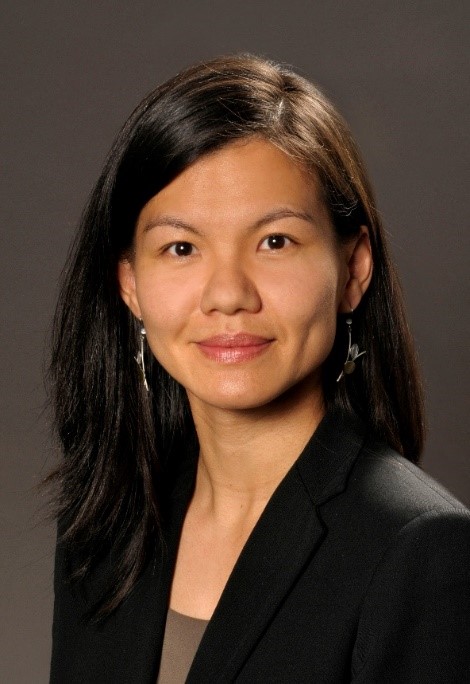JHSPH Alumni Profiles
Dr. Yen-Ching Wu, PhD
 Dr. Yen-Ching Wu conducted her postdoctoral research at the Bloomberg School of Public Health in the Department of Biochemistry and Molecular Biology in the lab of Dr. Jiou Wang, where she studied the role of mutations in an RNA binding protein called Fused in Sarcoma (FUS) that are associated with amyotrophic lateral sclerosis (ALS). Dr. Wu completed her PhD at Johns Hopkins in the Neuroscience Department of the School of Medicine in the lab of Dr. Jay Baraban. After her postdoctoral training, she worked at the Food and Drug Administration (FDA) as a visiting scientist for a year as a recipient of the Oak Ridge Institute for Science and Education (ORISE) fellowship. Following her fellowship, Dr. Wu became a staff fellow and remained at the FDA as a Toxicology Reviewer in the Division of Food Contact Notifications at the Office of Food Additives. She currently works at McCormick & Company, Inc. in Maryland as a Regulatory Toxicologist and Food Safety Scientist.
Dr. Yen-Ching Wu conducted her postdoctoral research at the Bloomberg School of Public Health in the Department of Biochemistry and Molecular Biology in the lab of Dr. Jiou Wang, where she studied the role of mutations in an RNA binding protein called Fused in Sarcoma (FUS) that are associated with amyotrophic lateral sclerosis (ALS). Dr. Wu completed her PhD at Johns Hopkins in the Neuroscience Department of the School of Medicine in the lab of Dr. Jay Baraban. After her postdoctoral training, she worked at the Food and Drug Administration (FDA) as a visiting scientist for a year as a recipient of the Oak Ridge Institute for Science and Education (ORISE) fellowship. Following her fellowship, Dr. Wu became a staff fellow and remained at the FDA as a Toxicology Reviewer in the Division of Food Contact Notifications at the Office of Food Additives. She currently works at McCormick & Company, Inc. in Maryland as a Regulatory Toxicologist and Food Safety Scientist.
I wear several hats at McCormick. I have an outwardly facing role where I attend various trade association meetings, scientific conferences, and webinars that enable me to inform the company of any changes in regulation, new scientific findings, or other events that is relevant to the food industry and that may impact the company. At times, I may engage with various stakeholders as needed if our feedback is important to a topic. Internally, I support the company by conducting safety assessments as part of our chemical, allergen, or incidental management, and will also respond to scientific inquiries that may come up.
The transition from academia to FDA was initially challenging because it was my first time in over a decade stepping away from the bench. The subject matter at the FDA was also initially difficult since learning regulations and applying them was like learning a new language. The onboarding process was also onerous, requiring background checks, fingerprinting and attending orientation. It took a longtime to understand how the FDA is structured to adapt to a job where there is essentially little room for creativity. Unlike my role as an independent investigator at Hopkins, at the FDA my work was always reviewed by my supervisor. Any writing that I produced had to be fully vetted by multiple reviewers in the agency. The perk of working at FDA was that I could work from home twice a week and I never had to work on weekends, which was something I routinely did as a post-doc. Because DFCN is relatively small, the number of people I interacted with was relatively limited and I had limited exposure outside of the agency. In contrast, working in the private sector requires me to work cross functionally with many different individuals across several functions: legal, supply chain, plant managers, regulatory analysts, customer quality. Because McCormick is a global company, it is quite common to work with someone you have never even met in person. Additionally, for the first time, I had to attend trade association meetings and network with strangers, something I did little of in academia and at the FDA.
Valuable skillsets I gained during my academic training include project management, time management, the ability to use power point as a platform to communicate effectively, and problem solving. My training also gave me scientific fluency which enabled me to learn some toxicology on the job at FDA. Learning regulation on the job also greatly added valuable. It was the combination of my doctorate, working knowledge of toxicology and regulation and ability to communicate effectively, that earned me my current job.
During graduate school I had originally intended on pursuing a tenure track professorship but opted for an alternate option because I had a growing family and the outlook for scientific funding was bleak. I knew I wanted to apply my scientific training for the benefit of public health, which is why I initially joined the FDA. At McCormick, I continue with this endeavor by promoting food quality and safety.
I did a wide internet search and found it advertised through a National institute of Health website.
I would recommend obtaining work experience in the FDA/EPA or food sector and consider becoming certified as a Diplomate of the American Board of Toxicology (DABT). I managed to get my position without one, but it is helpful to have one if you don’t have lots of work experience.
As a post-doc, the salary range was from $35K-45K at the time. The ORISE fellowship was $89K but didn’t include health insurance and was pre-tax. FDA salaries are publicly available, but typically with a PhD you start as a GS-11. With post-doctoral training or industry experience you could start at a GS-12. For the private sector, starting salaries depend on prior work experience and can start from 80K for more entry level and go up from there.
In the government, the health benefits are very good and the structure of the organization, employee salaries, and path to career development is relatively clear. The job duties are also clearly defined and typically narrow in scope unless an individual is more senior and has special projects. The atmosphere is still very academic as most employees have PhDs and there are opportunities to attend webinars and seminars and continue one’s educational development. A con is that there is some seniority and therefore you must establish yourself before you have any outward facing experience. Additionally, because the job duties can be very narrow in scope, you don’t learn a lot about current events outside of your specific function. Another con is the lack of funding, so I was limited to one conference a year.
At McCormick, my job duties are broader and so I have learned a lot more in a narrower time frame than I did when I was at the government. Since the company is made up of many different functions, there are a lot of opportunities for cross-functional collaboration. I have learned a lot about the business outside of my discipline. I have also been able to attend more conferences and meet other toxicologists and network, which is a great way to establish a collegial supportive environment. McCormick also offers periodic discounts to their products and treats their employees with free beverages and occasional free luncheons to celebrate milestones. They also offer opportunities for career development through the courses they offer, including Flavor University, and provide leadership training, which is great. A con is that since there a fewer scientists at the company, I have fewer opportunities to have scientific discussions with peers. As with any company, there is less transparency with salaries and the structure of a global company like McCormick can be initially confusing when you are new. On the flip side, this provides ample opportunity to meet a lot of different people from across disciplines and cultures.
Other possible career paths include working in regulatory and scientific affairs, as scientific program managers, in a trade association, as a scientist in government (e.g., EPA, FDA), science policy, in biotech companies and the cosmetics industry.
Attend conferences such as the Society of Toxicology and conduct informational interviews and attend job fairs.
